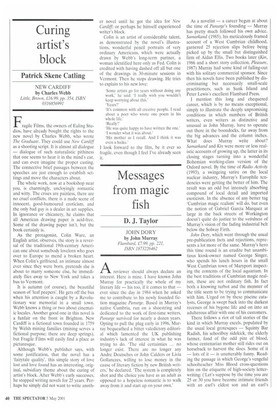Curing artist's block
Patrick Skene Catling
NEW CARDIFF by Charles Webb Little, Brown, £16.99, pp. 354, ISBN 0316856991 Fragile Films, the owners of Ealing Studios, have already bought the rights to the new novel by Charles Webb, who wrote The Graduate. They could use New Cardiff as a shooting script. It is almost all dialogue — dialogue of such naturalistic pithiness that one seems to hear it in the mind's ear, and can even imagine the proper casting. The connective brief passages between the speeches are just enough to establish settings and move the characters about.
The whole work, now at a bookshop near you, is charmingly, uncloyingly romantic and witty. The crises are painless, there are no cruel conflicts, there is a nude scene of innocent, good-humoured eroticism, and the only bad guy is a dealer in art supplies. In ignorance or chicanery, he claims that all American drawing paper is acid-free. Some of the drawing paper isn't, but the book certainly is.
As the protagonist, Cohn Ware, an English artist, observes, the story is a reversal of the traditional 19th-century American one about somebody lovelorn who goes over to Europe to mend a broken heart. When Colin's girlfriend, an intimate almost ever since they were born, pretends she is about to marry someone else, he immediately flies away to New York and takes a bus to Vermont.
It is autumn (of course), the beautiful season of 'leaf peepers'. He gets off the bus when his attention is caught by a Revolutionary war memorial in a small town. Webb knows a thing or two about cinematic locales. Another good one in this novel is a funfair on the front in Brighton. New Cardiff is a fictional town founded in 1759 by Welsh mining families (mining serves a fictional purpose; there are deep springs). but Fragile Films will easily find a place as picturesque.
Although Webb's publisher says, with some justification, that the novel has a 'fairytale quality', this simple story of love lost and love found has an interesting, original, subsidiary theme about the curing of artist's block. After Webb's early successes, he stopped writing novels for 25 years. Perhaps he simply did not want to write anoth
er novel until he got the idea for New Cardiff: or perhaps he himself experienced writer's block.
Colin is an artist of considerable talent, as demonstrated by the novel's illustrations, wonderful pencil portraits of very ordinary Americans, which were actually drawn by Webb's long-term partner, a woman identified here only as Fed. Cohn is credited with having dashed off all but one of the drawings in 30-minute sessions in Vermont. Then he stops drawing. He tries to explain to his new love:
'Some artists go for years without doing any work,' he said. 'I really wish you wouldn't keep worrying about this.'
'Years?'
It's common with all creative people. I read about a poet who wrote one poem in his whole life.'
'Really?'
He was quite happy to have written the one.' 'I wonder what it was about.'
'His mother as I recall. And [think it was even a haiku.'
I look forward to the film, be it ever so fragile, even though I feel I've already seen it.










































































 Previous page
Previous page